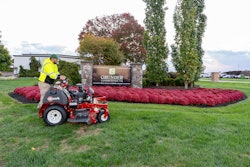 Photo: Kinghorn Gardens
Photo: Kinghorn GardensThis is part two in a two-part series. Click here to read part one.
Challenges
While keeping the pipeline filled is fairly simple when Kinghorn Gardens is consistently doing its best work, the greater challenge is finding the labor to complete the jobs.
Like almost every other landscaping company in the business, Kinghorn Gardens is struggling to overcome the shrinking labor pool problem. With a low unemployment rate, the firm is not only competing with other lawn care and landscape businesses for workers but with other industries that provide a far easier way to make a living.
In order to let more people know about their profession, Kinghorn works to make itself as visible as possible. This includes everything from traveling to local community colleges and talking with both teachers and students to participating in the career fair at the National Collegiate Landscape Competition (NCLC).
 Dan Moore, director of operations, recruits students at NCLC to become employees for Kinghorn Gardens.
Dan Moore, director of operations, recruits students at NCLC to become employees for Kinghorn Gardens. Photo: Jill Odom
Bryan Kinghorn, president of the company, admits that it’s a hard sell, convincing students to move to Omaha, Nebraska, but its slogan of “You would look good in purple” successfully caught the eye of some, including Caitlynn McVey, who is a head gardener with Kinghorn Gardens.
McVey met Dan Moore, director of operations for Kinghorn at the 2016 NCLC at Mississippi State University and did an internship with the company that summer and was hired the following year.
As a head gardener, McVey handles caring for the properties with tasks like pruning, watering, weeding and any other duties that need to be handled in the landscape.
“It’s just a great atmosphere,” McVey said. “The people are awesome. I’m learning something new every day. It’s nice to have those people there to answer any questions you have, so it’s nice to work with a great team.”
Kinghorn says the employees are recognized and known for their purple polos when out in the field and people hold them to certain expectations.
“I think it’s a noble profession and I think what we’ve delivered to the marketplace is important, and so, I thought that our people should be represented in a way that’s professional,” he said. “They should have collars on their shirts and we should carry the color purple because it represents a certain standard, and so, we’ve turned the purple polo into something that’s significant and means something.”
 Spaces like this rooftop garden are extra challenging when Nebraska already has extreme weather.
Spaces like this rooftop garden are extra challenging when Nebraska already has extreme weather.Photo: Jill Odom
The seasonality is another part of the reason it is so hard to entice employees to enter the green industry. Of its close to 50-person staff, Kinghorn employs only around 15 members who stay on full-time. Since the company does not do snow removal, work comes to a stop once flurries start to appear. This typically lasts from December to February, but Kinghorn says one time in the ’90s, a snow storm started in October and things didn’t start back up until early March.
Nebraska’s weather is particularly challenging when it comes to plant care. The state is extremely windy, or “well-ventilated” as Kinghorn would say.
Aaron Bryan, a project manager who has been with the company for 10 years, says that dealing with the elements is the hardest thing about his job, but they have to find ways to be creative when the weather is not cooperating.
“You just keep pushing,” Bryan said. “We pushed through it by finding things we can do, weather permitting.”
Adapting for the better
One of the challenges Kinghorn Gardens has faced that actually helped it for the better occurred during the recession. While the economy in Nebraska commonly doesn’t experience boom and bust cycles like some areas, Kinghorn says customers were still reluctant to start new projects.
 Photo: Kinghorn Gardens
Photo: Kinghorn Gardens“There was so much press and so much concern about what was going on in other sectors of the economy,” Kinghorn said. “I think our marketplace felt guilty by association, so construction activity dropped. People were still interested in doing maintenance but maybe not initiating too many projects that would be a little bit riskier.”
It proved to be a difficult time and caused the company to do something they said they’d never do. Kinghorn Gardens began to offer mowing services.
“We had to broaden our menu of services to help shore up some of the shortfalls in other areas/service offerings,” he said.
While the economy is thriving once more, Kinghorn has retained its mowing services and found it rounded out the company’s menu of services well.
“In some aspects, it turned out to be a good thing because we’ve become a turnkey provider to do a broader range of services for the clients we are of service to,” he said.
Keys to success
If Kinghorn has to do it all over again and start his company from scratch, he says there are certain things he knows he would do again.
The first thing that he says new landscapers should do is surround themselves with good people.
“We’ve always had the opportunity to interact with great people,” Kinghorn said. “Good people who are really talented and capable and I guess just value and enjoy the same things that we value and enjoy. Some of the people have been with us for a long time and we need them. They’re a critical part of our success. I don’t discount that.”
 Photo: Jill Odom
Photo: Jill OdomWhile Kinghorn says it’s hard to isolate certain individuals or roles that are the most important, he does recognize that the company’s CFO, design team, head of horticulture and director of operations all play crucial parts.
Some of the people he advises landscapers to find include a good accountant and a good attorney.
“I was a little naïve in regards to all the tax obligations and all the regulations and all the other things that you need to be compliant with,” he said. “So try to get yourself up to speed on that as quick and as fast as possible and be adaptive because those things are fluid and they change.”
An employee that Kinghorn is currently looking to add to his team is good HR person to help boost their success and take those job responsibilities off of others’ plates.
Another aspect that he says is important to establish early on is focusing on the work of the business.
“The work of the business is getting ready for what’s next and getting additional work into the pipeline, so I think if I was to start over again I would have a little better grasp on the work of the business and make sure that your marketing activity is much more consistent,” Kinghorn said.
Social media
One of the ways that the company markets itself is through social media, where it has a fairly strong presence thanks to having an employee dedicated to posting.
Unlike some businesses that merely use their Facebook pages to promote sales, Kinghorn says he wants the company’s social media platforms to reinforce the positive, joyful and happy things in life.
Kinghorn Gardens also just recently updated and remodeled its website, which Kinghorn rates at a seven or an eight, but he would prefer to know what the people who use it think about it.
One notable aspect about the company’s website is its well-maintained blog, which includes spotlights on company employees, recent project work and landscaping topics.
 Kinghorn Gardens uses its social media accounts to promote positive things in life.
Kinghorn Gardens uses its social media accounts to promote positive things in life.Kinghorn Gardens’ marketing director is responsible for managing the articles and sometimes other employees will submit stories on topics that are relevant and seasonally appropriate.
The education articles cover everything from why the seasonal color department is moving away from using certain plants to how to create winter interest in the garden. This can help Kinghorn’s customers better understand and appreciate the services the company provides.
The people articles touch on what a specific employee does, why they do what they do and what the purple polo means to them.
“We like to highlight our employees because I think people like knowing who’s on their property,” Kinghorn said. “They like knowing the background of them and what their capabilities, capacities and educational backgrounds are and what makes them tick. It’s a really nice way for us to introduce them to our clientele and other people in the marketplace.”
The focus on people and plants in the company blog can point back to what Kinghorn likes best about his job.
“Watching people grow and develop, watching them be more confident and capable and taller and freer and healthier and better able to do their job; I like that a lot,” he said. “And I like watching plants grow, too, and I like seeing great landscapes and all the other pieces and parts of it, but I really like seeing other people be successful.”









